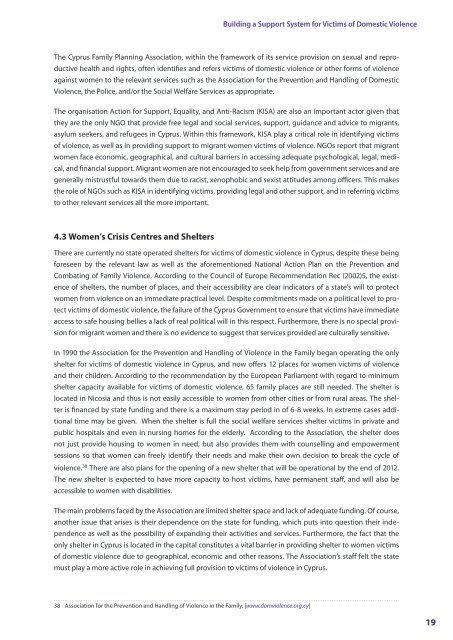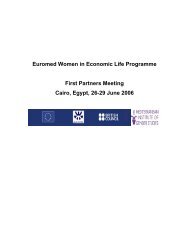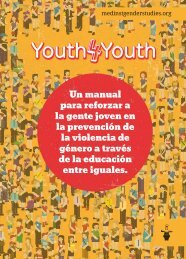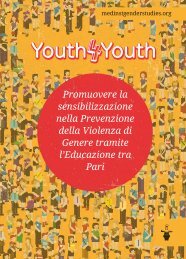react to domestic violence
react to domestic violence
react to domestic violence
You also want an ePaper? Increase the reach of your titles
YUMPU automatically turns print PDFs into web optimized ePapers that Google loves.
Building a Support System for Victims of Domestic Violence<br />
The Cyprus Family Planning Association, within the framework of its service provision on sexual and reproductive<br />
health and rights, often identifies and refers victims of <strong>domestic</strong> <strong>violence</strong> or other forms of <strong>violence</strong><br />
against women <strong>to</strong> the relevant services such as the Association for the Prevention and Handling of Domestic<br />
Violence, the Police, and/or the Social Welfare Services as appropriate.<br />
The organisation Action for Support, Equality, and Anti-Racism (KISA) are also an important ac<strong>to</strong>r given that<br />
they are the only NGO that provide free legal and social services, support, guidance and advice <strong>to</strong> migrants,<br />
asylum seekers, and refugees in Cyprus. Within this framework, KISA play a critical role in identifying victims<br />
of <strong>violence</strong>, as well as in providing support <strong>to</strong> migrant women victims of <strong>violence</strong>. NGOs report that migrant<br />
women face economic, geographical, and cultural barriers in accessing adequate psychological, legal, medical,<br />
and financial support. Migrant women are not encouraged <strong>to</strong> seek help from government services and are<br />
generally mistrustful <strong>to</strong>wards them due <strong>to</strong> racist, xenophobic and sexist attitudes among officers. This makes<br />
the role of NGOs such as KISA in identifying victims, providing legal and other support, and in referring victims<br />
<strong>to</strong> other relevant services all the more important.<br />
4.3 Women’s Crisis Centres and Shelters<br />
There are currently no state operated shelters for victims of <strong>domestic</strong> <strong>violence</strong> in Cyprus, despite these being<br />
foreseen by the relevant law as well as the aforementioned National Action Plan on the Prevention and<br />
Combating of Family Violence. According <strong>to</strong> the Council of Europe Recommendation Rec (2002)5, the existence<br />
of shelters, the number of places, and their accessibility are clear indica<strong>to</strong>rs of a state’s will <strong>to</strong> protect<br />
women from <strong>violence</strong> on an immediate practical level. Despite commitments made on a political level <strong>to</strong> protect<br />
victims of <strong>domestic</strong> <strong>violence</strong>, the failure of the Cyprus Government <strong>to</strong> ensure that victims have immediate<br />
access <strong>to</strong> safe housing bellies a lack of real political will in this respect. Furthermore, there is no special provision<br />
for migrant women and there is no evidence <strong>to</strong> suggest that services provided are culturally sensitive.<br />
In 1990 the Association for the Prevention and Handling of Violence in the Family began operating the only<br />
shelter for victims of <strong>domestic</strong> <strong>violence</strong> in Cyprus, and now offers 12 places for women victims of <strong>violence</strong><br />
and their children. According <strong>to</strong> the recommendation by the European Parliament with regard <strong>to</strong> minimum<br />
shelter capacity available for victims of <strong>domestic</strong> <strong>violence</strong>, 65 family places are still needed. The shelter is<br />
located in Nicosia and thus is not easily accessible <strong>to</strong> women from other cities or from rural areas. The shelter<br />
is financed by state funding and there is a maximum stay period in of 6-8 weeks. In extreme cases additional<br />
time may be given. When the shelter is full the social welfare services shelter victims in private and<br />
public hospitals and even in nursing homes for the elderly. According <strong>to</strong> the Association, the shelter does<br />
not just provide housing <strong>to</strong> women in need, but also provides them with counselling and empowerment<br />
sessions so that women can freely identify their needs and make their own decision <strong>to</strong> break the cycle of<br />
<strong>violence</strong>. 38 There are also plans for the opening of a new shelter that will be operational by the end of 2012.<br />
The new shelter is expected <strong>to</strong> have more capacity <strong>to</strong> host victims, have permanent staff, and will also be<br />
accessible <strong>to</strong> women with disabilities.<br />
The main problems faced by the Association are limited shelter space and lack of adequate funding. Of course,<br />
another issue that arises is their dependence on the state for funding, which puts in<strong>to</strong> question their independence<br />
as well as the possibility of expanding their activities and services. Furthermore, the fact that the<br />
only shelter in Cyprus is located in the capital constitutes a vital barrier in providing shelter <strong>to</strong> women victims<br />
of <strong>domestic</strong> <strong>violence</strong> due <strong>to</strong> geographical, economic and other reasons. The Association’s staff felt the state<br />
must play a more active role in achieving full provision <strong>to</strong> victims of <strong>violence</strong> in Cyprus.<br />
38 Association for the Prevention and Handling of Violence in the Family. [www.dom<strong>violence</strong>.org.cy]<br />
19







